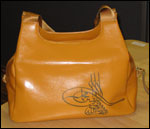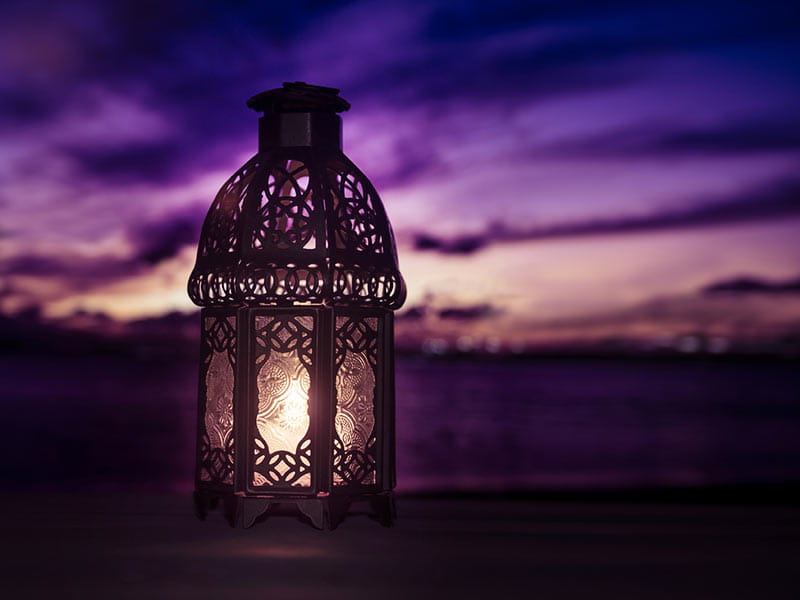Honestly, it wasn’t the Arabic script, or a burning desire to elicit questions and spark conversation that drew me to the purse. I bought it because it was pretty, functional, and just the right size. But I knew I had to find out what I was carrying around. So my first move was to consult several Arabic speakers I knew--Muslim and non-Muslim--to get different translations.
 They all came to roughly the same conclusion: “Allah helps Mohammad to triumph over his enemies.” There was some disagreement about whether it meant “his” enemies as in Mohammad’s personal enemies, or those of Islam in general. But nonetheless I was satisfied with the translation. I had an answer for “Do you know what that means?” I took my new purse with me everywhere.
They all came to roughly the same conclusion: “Allah helps Mohammad to triumph over his enemies.” There was some disagreement about whether it meant “his” enemies as in Mohammad’s personal enemies, or those of Islam in general. But nonetheless I was satisfied with the translation. I had an answer for “Do you know what that means?” I took my new purse with me everywhere.
The first time someone approached me was in a magazine store on Park Avenue in Manhattan. I popped in to pick up some reading for the subway and the two employees, who had been having a heated conversation when I walked in, suddenly fell silent. They both stared at me for a moment, and one said, “Um, Miss? Did you know that you have Arabic on your purse?” He said it the same way someone might tell you that you have something gross stuck in your teeth.
“Yeah,” I said.
“Do you know what it means?” asked the second man.
“Allah helps Mohammad to triumph over his enemies,” I smoothly replied.
Both men were impressed. “You’re not Muslim, are you?” asked the first one.
“Jewish,” I answered.
There was silence for a moment, and then the second man asked me my name. We began a conversation that lasted at least 20 more minutes, talking about everything from jobs to where we lived to where I’d purchased the bag. Now whenever I go back into that magazine shop, the employees always recognize me and give me a hearty hello.
My bag, in addition to being the perfect size for a couple of books and a granola bar, has led me to conversations I might never have had otherwise. Different Muslims have come up to me on the street and in the grocery store to ask if I understood the Arabic script, and every single one of them was kind, cool, and excited that I had some idea what I was talking about.
But the experience hasn’t been totally rewarding. A week ago, I posted an entry about my purse on the popular Jewish website www.jewschool.com, to which I am a regular contributor. Jewschool’s writers and readership are overwhelmingly male, politically active, and from observant backgrounds. I was hired because I was none of these things.
My articles tended to be more about local cultural events or media representations of Jews. My posting, “Building Bridges With Mustard-Colored Leather?” garnered a huge volume of responses. And they were completely unlike anything I’d expected.
One reader called me a “cultural parasite” and suggested that I start wearing a sari and get a Chinese-character tattoo. Several claimed that the message on my bag was a “call to jihad” and that I was inciting Muslim extremists. Quite a few didn’t really care what I had to say and focused more on the photo of me holding up my bag, which accompanied the piece, debating whether I was attractive. I spent several days in a funk, amazed that I’d been supported more by people outside of my faith than within it.
Then I got an email from a man I’d never met, the managing editor of a prominent and respected Jewish culture magazine, who praised my writing and the way I’d handled the response. Suddenly, someone believed in me again. It was exactly the thing I needed to remind me that plenty of Jews are open-minded, tolerant, and kind. I posted on the site again, this time about something completely different, and went back to my life.
I’ve always believed that the road to peace is built one person at a time, and the wonderful interactions I’ve had with Muslim people as a result of simply carrying around a bag mean more to me than any Israeli election or political party. Concepts like war and peace and hatred are difficult to picture, but human beings are easily visualized.
When I watch news on TV or read about it online, I’m dealing with terminology and people I don’t know. When there’s so much negativity in the world--war in countries on the other side of the world, starvation, genocide, and hatred--I wonder what I can possibly do to make any of it better.
Carrying a purse around may not seem significant at all, but it’s enabled me to break down a large inter-religious conflict into small, palatable pieces. It’s not Jews and Muslims; it’s me and Omar, the guy I know who works in the magazine store. I may not be signing peace treaties, but I’m fostering dialogue in my own small way.
And if I can lug around all my stuff with me in the meantime, bonus.

